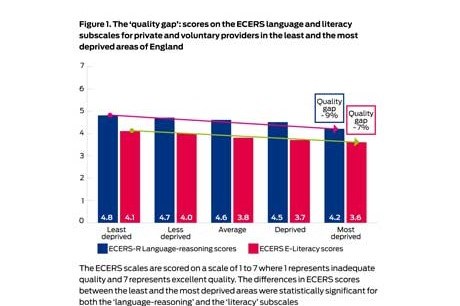Quality and Inequality: It's time to level the playing field
Sandra Mathers
Monday, June 2, 2014
Settings catering to disadvantaged threes and fours offer lower quality, according to new research from the University of Oxford and published by the Nuffield Foundation. Lead author Sandra Mathers explains the findings and implications.

Among the much-reported headlines following the recent Ofsted annual early years report, debating whether or not two-year-olds should be in schools, were vital but overlooked messages about the chances of all disadvantaged children to access good-quality provision.
Data published in the report show that fewer settings in disadvantaged areas are graded as good or outstanding: only 76 per cent of non-domestic providers in the most deprived areas, for example, compared with 86 per cent in the least deprived areas(1). The picture is similar for primary schools, with 73 per cent in the most deprived areas good or outstanding, compared with 88 per cent in the least deprived areas.
These findings should be of great concern. The EPPE research(2) has shown that disadvantaged children have the most to gain from good-quality provision, yet Ofsted's figures suggest they are the least likely to experience it. But we also know from previous research that Ofsted grades do not necessarily give a complete picture of quality(3), so how confident can we be in Ofsted's conclusions?
In our research study, we explored the relationships between quality and disadvantage in a more rigorous way, using the research-validated Environment Rating Scales ECERS-R and ECERS-E. Using quality data on 1,079 private and voluntary settings, and 169 nursery and primary schools, we compared ECERS scores for settings and schools in the most disadvantaged(4) and least disadvantaged areas.
Lower quality
Our findings for the private and voluntary sector were worrying. Mirroring Ofsted's conclusions, we found that settings catering to disadvantaged areas and children were of lower quality. Most concerning was the fact that the 'quality gap' between settings in the least and most deprived areas was widest when it came to support for language and literacy skills (9 per cent and 7 per cent respectively), as shown in Figure 1.

Access to good-quality support for language development is vital for disadvantaged children, whom research shows are already almost a year behind those from wealthier backgrounds in terms of their vocabulary by the age of five(5). Language skills during the early years are one of the strongest predictors of later success, and EYFSP data show literacy is the area in which the greatest proportion of children are below the expected stage of development by age five(6).
Although we cannot claim any causal link between our findings on quality and EYFSP scores, our analysis does suggest that the children most in need of good-quality support for language and literacy are actually the least likely to receive it. These children are doubly disadvantaged: first of all by their circumstances, and then by the quality of early years provision they receive.
Maintained sector
The picture was different when it came to the maintained sector. Primary and nursery schools catering to disadvantaged areas and children were as good as - and sometimes better - than those serving the more advantaged. The schools in our study were doing a good job in meeting the needs of the most vulnerable children.
This appears at first glance to contradict Ofsted's figures showing that primary schools in deprived areas tend to be graded lower. But it is less puzzling when we remember that Ofsted's overall grades reflect provision across the whole school, whereas our ECERS data capture the quality of early years provision. So, despite an overall tendency for primary schools in deprived areas to be of lower quality, both primary and nursery schools are in fact offering good-quality early years provision for disadvantaged threeand four-year-olds.
This is borne out by Ofsted data for nursery schools (where the overall grade reflects early years quality), which show that schools in deprived areas are just as highly graded as those in less deprived areas. This finding has implications for the reintroduction of the Ofsted EYFS grade in schools (currently under consultation). If the overall Ofsted grade for primary schools does not accurately reflect the quality of early years provision, then having a separate early years grade will be vital to identifying whether schools are effectively meeting young children's needs.
Why are schools better equipped?
So how is it that schools are able to provide good quality for disadvantaged children while the PVI sector struggles to? Our research highlights the challenges involved in meeting the needs of children who may be at greater risk of language delay and behaviour problems, many of whom will speak English as a second language. Their needs are likely to be both more diverse and more complex, and require more skilled and informed practice.
And, in fact, this is what we concluded - that a large part of the answer lies in the workforce. Whereas all school classes are led by a qualified teacher, less than half of PVI settings are able to employ a graduate, and only 8 per cent have more than one.
In our study, the tendency for quality to be lower among private and voluntary settings in deprived areas was much stronger in those without a graduate. Among non-graduate settings there was a steep drop in quality - for example, scores on the ECERS 'language and reasoning' subscale were 10 per cent lower in deprived areas. But when we looked only at graduate settings (those with a qualified teacher or EYP on the team) the quality gap was much narrower: only 3 per cent.
This makes intuitive sense. It is not hard to make the link between specialised and high-level training and the ability to provide good-quality language support for children who are more likely to be behind in their language development. A more pressing question concerns what can be done about it: how do we improve quality in disadvantaged areas?
Graduate leadership matters
The obvious implication is that graduate leadership matters; and that it matters most for disadvantaged children. Our report recommends further government support for increasing the number of graduates working in PVI settings catering to deprived children. The newly announced early years pupil premium - extra money for each disadvantaged threeand four-year-old on the register - will help with this.
The DfE should not miss the opportunity to give a clear message about priorities for spending this extra funding, to make sure it is used in a targeted and productive way to raise the quality of the workforce.
But even this may not be enough. We do not yet know the amount that schools and settings will receive, but the closest estimate I can come to is a few hundred pounds per child per year. In a large school or setting in a disadvantaged area, this may go a long way. But in a smaller setting serving equally disadvantaged children, the extra funding will not be enough to attract and retain a new teacher or EYP.
We cannot expect graduates to work in the most challenging areas and with the most challenging children for the love of the job - although many do. More support is urgently needed to improve the pay, status and qualifications of practitioners across the early years workforce.
We cannot ignore the disparities between sectors: early years teachers, despite the new 'teacher' label, do not have the same pay or status as qualified teachers, and yet we expect them to match the maintained sector in terms of quality.
No further divisions
We should not be surprised that differences in qualifications translate into differences in quality for disadvantaged children. But I do not see our report as pitting one sector against the other. Instead it highlights the challenges involved in providing good quality for children with a wide range of needs.
The maintained sector, with its additional resources, is already well equipped to meet these needs, and the private sector needs further support to help it do the same. This is not about pointing the finger but about recognising disparities in qualifications and pay. All sectors have the potential, given equal resources, to offer excellent care and education for disadvantaged young children; and the different sectors have much to learn from each other. Our efforts should focus on levelling the playing field and on the wider challenge of equipping all providers to support disadvantaged young children in reaching their full potential. As Julian Grenier argued in a recent article(7), this responsibility is too important to be lost in sector rivalries.
Sandra Mathers is a senior researcher and principal investigator at the University of Oxford Department of Education, and a director of A+ Education. Rebecca Smees, who also worked on this study, is a senior analyst at the University of Oxford Department of Education.
MORE INFORMATION
- The full report, 'Quality and Inequality: Do threeand four-year-olds in deprived areas experience lower quality early years provision?' by Sandra Mathers and Rebecca Smees can be accessed at www.nuffieldfoundation.org/news/disadvantaged-three-and-four-year-olds-losing-out-good-quality-nursery-provision
- About the lead author: www.education.ox.ac.uk/about-us/directory/sandra-mathers/
- A+ Education, www.aplus-education.co.uk
- The Nuffield Foundation is an endowed charitable trust that aims to improve social well-being in the widest sense. It has funded this project, but the views expressed are those of the authors and not necessarily those of the Foundation. More information is available at www.nuffieldfoundation.org
References
1 Ofsted Early Years Annual Report 2012/13, www.ofsted.gov.uk/earlyyearsannualreport1213
2 Early childhood matters: Evidence from the EPPE project by Sylva et al (2010), Routledge
3 Improving quality in the early years: a comparison of perspectives and measures by S Mathers, R Singler and A Karemaker (2012), University of Oxford and Daycare Trust
4 We measured deprivation using the Indices of Multiple Deprivation (IMD), which gives a relative measure of the deprivation experienced in every area in England
5 Low income and early cognitive development in the UK, www.suttontrust.com/our-work/research/item/low-income-and-early-cognitive-development-in-the-uk/
6 Early years foundation stage profile results: 2012 to 2013, www.gov.uk/government/publications/early-years-foundation-stage-profile-results-2012-to-2013
7 'Quality of provision - It's time to set aside sector rivalries'







